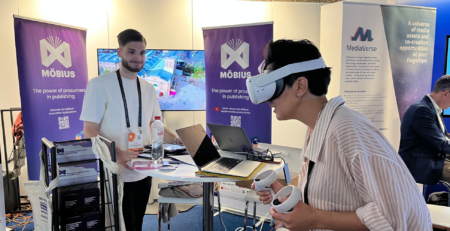The publishing industry through a cross-media approach. The example of the Möbius project in exploring new applications for the book sector and the role of the prosumer
Over the last decades, the adoption of digital technology led to the transformation of entire traditional sectors. This huge transformation has been defined as “convergence” (Chon et al., 2003). The term convergence has been widely used in literature over time in several disciplines, from social sciences to natural sciences. For this reason, it has different interpretations and multiple descriptions (Latzer 2013). In line with this, the concept has been described several times as one of the most known buzzwords of the 1990s (Latzer, 2014). The revolution of the Web 2.0 and further transformations such as social media, digital television and wireless communication directed the term convergence to gain high attention, improving the level of detail of the meaning and narrowing the boundaries of the definition. In the case of the creative and cultural industries, such massive use of technologies allowed to create new business models, adopt new ways of interaction among users, and develop new consumptions paths, letting emerge a more cross-sectoral attitude toward contents’ creation.
In the case of the publishing industry, it is possible to talk about cross-media publishing. As reported by Veglis et al. (2016), “Cross-media can be defined as the production of any content (news, music, text, images, etc.) for more than one media platform/channel (for example print, Web, and TV) within the same media organization (Veglis, 2005). The term refers to integrated experiences across multiple media, including the Internet, video and film, broadcast and cable TV, mobile devices, DVD, print, and radio (Davidson et al., 2010)”. As reported in the literature, cross-media usually implies a high level of user engagement, redefining the traditional value chain.
The Möbius project embraces the importance of the cross-media approach by exploring and investigating the definition of an enriched reading experience improved through audio-visual content provision. In the definition of such an innovative approach to reading, the role of the prosumer is central.
As reported by De Rosa et al. (2022), “the prosumer is an individual that can produce or improve goods and services they will eventually consume. In particular, in the publishing industry, the prosumer includes publisher-managed communities, and the millions of users participating and contributing to online communities of interest (e.g., fanfiction communities) that remain utterly untapped”. In this sense, the prosumer is no longer positioned at the end of the value chain but is central to the provision of contents and its fruition.
One of the aims of the Möbius project is to explore the role of the prosumer for the publishing sector as a key stakeholder to reshape a traditional value chain. The engagement of prosumers in the value chain can make a difference also in determining how to frame and design cross-media content and solutions. Indeed, as reported by Noorda and Berens (2021), one important finding of their study on the book sector worldwide is that “avid book engagers are equivalently active across other media. Rather than competing for customers, book and media professionals might think about how their product could benefit from cross-media discovery. We have found that the silos between media, and between parts of the publishing industry, are porous”.
The publishing sector faces an interesting transformation that will lead the industry to become more transversal rather than vertical. But companies in the industry have to learn more about consumer behaviours and cross-media opportunities before transforming their business. Accordingly, better and increased knowledge on the needs and behaviours of the prosumers could be beneficial in driving such inspiring transformation for the entire publishing sector. Möbius outputs, namely the Prosumer Intelligence Toolkit and the Möbius Book, aim to improve prosumers’ knowledge to inform and influence new business models and innovative ways to experience books.
Simona de Rosa | Member of the Board of Directors at the DEN Institute
References
Chon, B.S., Choi, J.H,, Barnett, G.A., Danowski J.A., and Joo, S.E. 2003. A Structural Analysis of Media Convergence: Cross-Industry Mergers and Acquisitions in the Information
Davidson, D. (Ed.) 2010. Cross-media communications: An introduction to the art of creating integrated media experiences. ETC Press.
De Rosa, S., Jennes, I., Van den Broeck, W., Van Dam, T., Cardenas, P. C., & Nicolai, A. 2022. The Role of Prosumer in Reshaping the Publishing Industry: Preliminary Findings from the Möbius Project. Publishing Research Quarterly, 1-10.
Latzer, M. 2014. Convergence, Co-evolution and Complexity in European Communication Policy. In K. Donders, C. Pauwels and J. Loisen, eds. The Palgrave Handbook of European Media Policy. Palgrave Macmillan.
Latzer, M. 2013. Media Convergence. In C. Handke & R. Towse (Eds.), Handbook of the Digital Creative Economy. Cheltenham: Edward Elgar, forthcoming.
Noorda, R., & Inman Berens, K. 2021. Immersive Media and Books 2020: New Insights About Book Pirates, Libraries and Discovery, Millennials, and Cross-Media Engagement: Before and During COVID.
Veglis, A. 2005. Implementation of a computer-supported collaborative work system in a newspaper. WSEAS Transactions on Information Science and Applications, 2, 891–902.
Veglis, A., Dimoulas, C., and Kalliris, G. Towards Intelligent Cross-Media Publishing: Media Practices and Technology Convergence Perspectives. In Lugmayr, A., & Dal Zotto, C. (Eds). 2016. Media Convergence Handbook-Vol. 1. Journalism, Broadcasting, and Social Media Aspects of Convergence. Springer Berlin. Industries, Journal of Media Economics, 16:3, 141-157.












